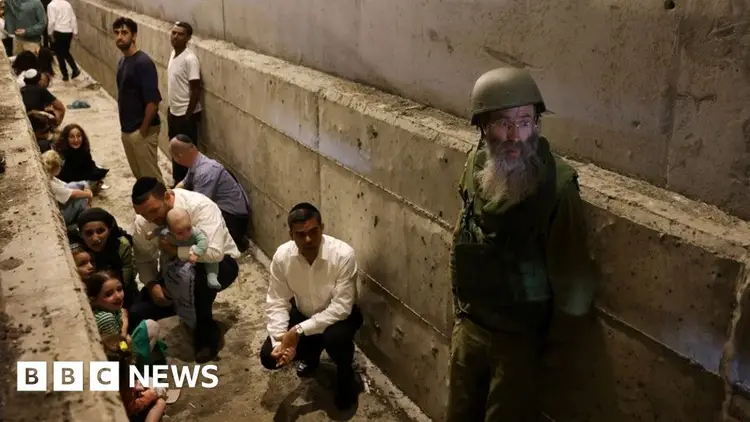Israel: First came the alert message, then the boom of interceptions

At approximately 7:30 PM local time, everyone's phone vibrated simultaneously with a notification.
It stated: "You need to go to a secure location right away and stay there until you receive more instructions."
The communication came from the Home Front Command of the Israel Defense Forces and concluded with the term "instructions for saving lives."
As missiles were fired at Israel from Iran, people started to seek refuge in secure areas.
The wailing sirens echoed throughout the nation, reaching the ears of millions.
When the alarm sounded outside, we headed to the safe area in the BBC's Jerusalem office, which is a secure section of the building without any windows.
We could hear constant thuds overhead as missiles passed by and were shot down by Israel's defense system.
Videos taken in this location and shared on social media platforms displayed bright trails of light as the missiles soared across Israel, accompanied by plumes of smoke when they were intercepted or exploded upon hitting their targets.
“There are so many of them,” a source said in a video taken in southern Israel, which features clusters of lights in the night sky.
Around 8:00 PM, the IDF reported that its air defense system was detecting and intercepting the missiles. They urged the public to “stay in a safe area until advised otherwise.”
It went on to explain, “The booming sounds you’re hearing are caused by intercepted missiles and debris that has fallen.”
Worries were growing throughout Israel as news surfaced in the early evening about Iran getting ready to launch an attack.
It happened just a few hours after Israeli forces launched an incursion into Lebanon, which the military describes as a "restricted, localized, and focused" ground mission aimed at Hezbollah.
Iran's Revolutionary Guards announced that they fired the missiles in response to recent strikes that resulted in the deaths of leaders from Hezbollah and Hamas, along with a high-ranking Iranian commander.
As missiles soared through the sky, texts and calls poured in from individuals across the nation, all huddled in their secure spaces.
"There's a constant sound of alarms, so we're taking shelter in a safe room... But we're managing for the moment," a mother of two from southern Israel shared with me in a voice message.
"Extremely frightening. I can hardly wrap my head around the fact that this is our reality... we came really close," read a message from a journalist in Tel Aviv.
"Typically, we remain on our floor and avoid going to the shelter, but this time… we understood that we needed to head downstairs."
"It was extremely noisy," attorney Efrat Eldan Schechter shared via WhatsApp from Ra'anana, located in central Israel. She also expressed her belief that "this is not over for the night."
"We have to wait and see how this unfolds. It’s certainly quite frightening… but we are resilient and trust that our IDF will keep us safe. Iran has just made a serious error."
Approximately an hour after the initial notification, devices buzzed once more with an update from the Home Front Command, informing everyone that they were permitted to exit shelters and safe zones.
After the attacks, the spokesperson for the IDF mentioned that there were impacts in central and southern regions of Israel. There have been a few reports of minor injuries.
Videos that were subsequently posted on social media displayed destruction caused by the missiles in various areas, including a significant crater in the ground close to Tel Aviv.
"Currently, we do not see any additional launches coming from Iran. It's important to remain cautious and follow any guidance provided," Daniel Hagari stated during a televised speech.
Israel reports that a minimum of 180 missiles were launched, with the majority successfully intercepted. They have warned that there will be "repercussions."









































































